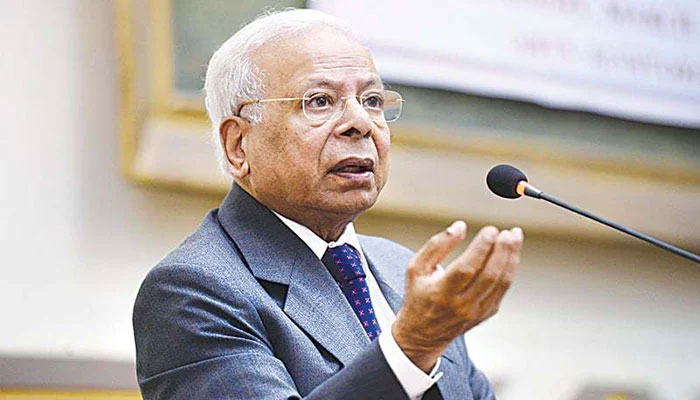Trade with India beneficial to Pakistan: ex-SBP chief
ISLAMABAD: Dr Ishrat Hussain, former adviser to prime minister, has said that frequent changes of the governments made it hard for the political leaders for opting for difficult choices because they always feared that they would be shown the door any time before completing their five-year term.
The political uncertainty, he said, resulted in Pakistan’s lagging behind other regional states, including India and Bangladesh. The former governor of the State Bank of Pakistan stated this while launching his book ‘Development Pathways India, Pakistan, Bangladesh from 1947-2022’ during a ceremony organised by the Institute of Strategic Studies here (ISS) here on Monday.
He also said that the trade between Pakistan and India would be beneficial for Pakistan on a medium- to long-term basis; it was established through evidence that Islamabad’s benefit would be eight times more than what we were getting today. He also proposed a neutral institutional framework to implement the civil service reforms and said the incumbent secretaries would never allow to implement the civil service reforms in Pakistan.
“The mainstream political parties largely evolved consensus on the issue of privatisation, deregulation, and liberalisation of the economic policies. There is a need to achieve political stability, consistency, and meritocracy in the policymaking and its effective implementation,” he said.
Ishrat Hussain highlighted the eight-point agenda on account of lessons learned and said that political stability was the necessary condition to bring the desired change. He said that there were 12 prime ministers changed in the last 25 years in Pakistan while in India three PMs changed whereas only two PMs changed in Bangladesh. He said that with the change of prime minister, the policies also altered, so the priorities also changed and the country got back to square one.
Second, the broad political consensus was the pre-requisite for achieving sustained and long-term growth trajectory, he added. He was of the view that reliance on external borrowings was not desirable because when the country got addicted to it, it never focused on generating required level of investments and savings. He was of the view that 45 percent of GDP were utilised for payment of debt servicing, which was not a viable preposition.
He highlighted that the state versus market, export led growth instead of import substitution, inclusive growth path, implementation of devolution plan and climate change were the path of the agenda for Pakistan.
-
 Is Elon Musk Set To Become First Trillionaire In 2026? Market Odds Explained
Is Elon Musk Set To Become First Trillionaire In 2026? Market Odds Explained -
 Prince Harry’s Protective Stance On Meghan Markle Sparked Rift With William, Charles
Prince Harry’s Protective Stance On Meghan Markle Sparked Rift With William, Charles -
 How BTS Push Through Performances As They Gear For 2026 Comeback
How BTS Push Through Performances As They Gear For 2026 Comeback -
 AI Copyright Battle: ByteDance To Curb Seedance 2.0 Amid Disney Lawsuit Warning
AI Copyright Battle: ByteDance To Curb Seedance 2.0 Amid Disney Lawsuit Warning -
 Savannah Guthrie In Tears As She Makes Desperate Plea To Mom's Kidnappers
Savannah Guthrie In Tears As She Makes Desperate Plea To Mom's Kidnappers -
 Canada’s Defence Industrial Strategy Targets 125,000 Jobs And Export Growth
Canada’s Defence Industrial Strategy Targets 125,000 Jobs And Export Growth -
 Tre Johnson, Former NFL Guard And Teacher, Passes Away At 54
Tre Johnson, Former NFL Guard And Teacher, Passes Away At 54 -
 Jerome Tang Calls Out Team After Embarrassing Home Defeat
Jerome Tang Calls Out Team After Embarrassing Home Defeat -
 Cynthia Erivo Addresses Bizarre Rumour About Her Relationship With Ariana Grande
Cynthia Erivo Addresses Bizarre Rumour About Her Relationship With Ariana Grande -
 Prince Harry, Meghan Markle Spotted Cosying Up At NBA All-Star Game
Prince Harry, Meghan Markle Spotted Cosying Up At NBA All-Star Game -
 Lady Gaga Explains How Fibromyalgia Lets Her 'connect With People Who Have It'
Lady Gaga Explains How Fibromyalgia Lets Her 'connect With People Who Have It' -
 Metro Detroit Weather Forecast: Is The Polar Vortex Coming Back?
Metro Detroit Weather Forecast: Is The Polar Vortex Coming Back? -
 Daniel Radcliffe Reveals Surprising Way Fatherhood Changed Him
Daniel Radcliffe Reveals Surprising Way Fatherhood Changed Him -
 ‘Disgraced’ Andrew At Risk Of Breaking Point As Epstein Scandal Continues
‘Disgraced’ Andrew At Risk Of Breaking Point As Epstein Scandal Continues -
 Alan Cumming Shares Plans With 2026 Bafta Film Awards
Alan Cumming Shares Plans With 2026 Bafta Film Awards -
 OpenClaw Founder Peter Steinberger Hired By OpenAI As AI Agent Race Heats Up
OpenClaw Founder Peter Steinberger Hired By OpenAI As AI Agent Race Heats Up




